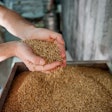
A container ship loaded with more than 65,000 tonnes of corn from Ukraine has been refloated after running aground in the Suez Canal.
The MV Glory was 24 miles into its southward journey through the canal when it suffered a technical fault, according to theSuez Canal Authority(SCA).
According toreports, the breakdown was expected to only cause minor delays and regular passage through the canal was expected to resume after tug boats moved it to a repair area.
On December 25, the ship leftChornomorsk portin southwest Ukraine and was heading to China with 65,970 metric tonnes of corn, according to theJoint Coordination Centre, which is overseeing Ukrainian grain exports.
Ukraine says Russia is delaying grain ship inspections
On December 26,it was reportedthat Ukraine's Infrastructure Ministry said some of the ships that had set sail from Ukraine under thegrain initiativehad been stuck in Turkish waters awaiting inspection for over a month. Ukraine accused the Russian delegation of deliberately stalling the process.
In total, 99 vessels were waiting for inspection in the Bosphorus Strait, with 72 of them headed west to be loaded at ports and 27 already carrying Ukrainian agricultural products.
TheBlack Sea Grain Initiative, initially reached in July, created a protected sea transit corridor and was designed to alleviate global food shortages by allowing exports to resume from three ports in Ukraine: Chornomorsk, Odesa and Yuzhny/Pivdennyi.
The ships were to travel through the humanitarian corridor set up in the Black Sea and stop in Istanbul, where they are checked by inspectors from Russia, Ukraine, Türkiye and the UN before continuing to the final destination.
Grain scheme exposed in Ukraine
On January 9, Ukraine'sSBU security serviceand Bureau of Economic Security (BEB), exposed agrain exportscheme that has cost the country $142 million.
According toreports, more 10 high-ranking officials are involved in the scheme. Among them are the deputy head of a department at the State Customs Service or DMSU, and senior officials of the Odesa Customs House. Together they developed a large-scale scheme for tax evasion in exports of Ukrainian grain.
According to law enforcement officers, more than 370 commercial structures were involved in the scheme. Through them, the suspects bought wheat in bulk from private farmers, agricultural enterprises and large agricultural holdings.
In order to muddle up trade chains and avoid mandatory payments to the budget, the “businessmen” transferred products from one bogus firm to another. Only after that did they sell grain to exporters for sale abroad.






















